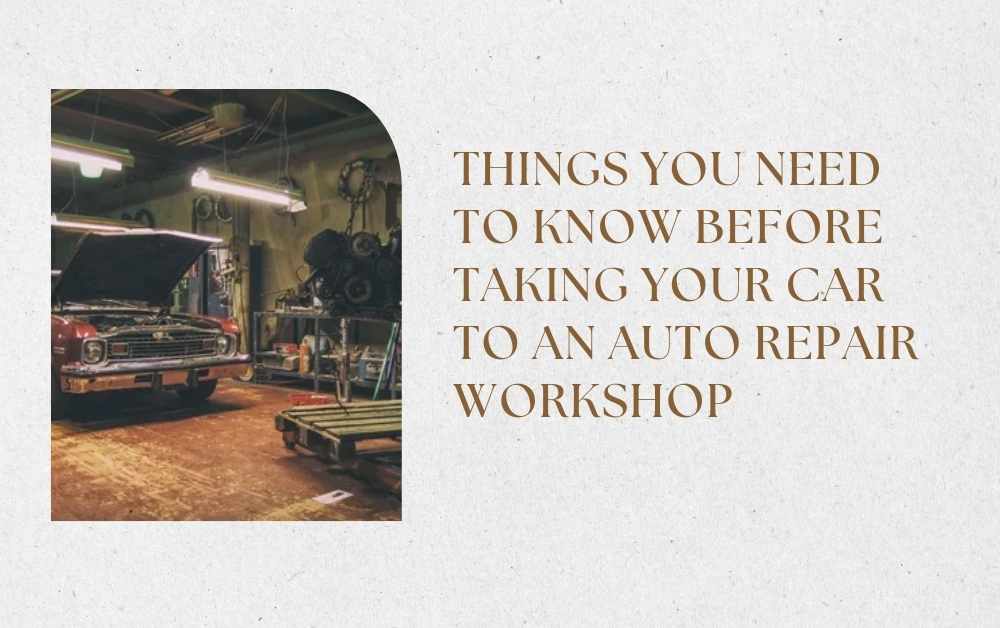Maintaining a car involves more than just driving it. Regular maintenance and occasional repairs are essential to keep your vehicle running smoothly. When it’s time to visit an auto repair workshop, there are several things you should know to ensure you get the best service possible. In this blog, we will cover everything you need to know before taking your car to an auto repair workshop, from choosing the right shop to understanding the repair process.
NOTE : Ready to give your car the care it deserves? Visit our Auto Repair Workshop in Dubai for expert services and unmatched quality. Book your appointment today and experience the difference!
Choosing the Right Auto Repair Workshop
When it comes to choosing an auto repair workshop, you want to make sure you’re leaving your car in capable hands. Start by asking for recommendations from friends, family, or coworkers. Personal referrals are often reliable because they come from people you trust who have had direct experiences with the shop. Another good place to look is online reviews. Websites like Google, Yelp, and the Better Business Bureau can provide insights into the reputation of various auto repair shops. Look for shops with consistently positive feedback and high ratings.
Once you have a few potential workshops in mind, visit them in person. Check out the cleanliness and organization of the shop. A well-maintained shop often reflects the quality of work you can expect. Talk to the mechanics and ask about their certifications and experience. ASE (Automotive Service Excellence) certification is a good indicator that the mechanics are qualified. Additionally, ask if the shop specializes in your car’s make and model, as this can make a significant difference in the quality of the repairs.
Understanding the Costs and Getting Estimates
Before committing to any repairs, it’s crucial to understand the costs involved. Auto repairs can be expensive, and it’s always a good idea to get a written estimate before any work begins. An estimate should include a breakdown of parts, labor, and any additional fees. Be wary of shops that provide vague estimates or refuse to give a written one.
It’s also beneficial to get estimates from multiple shops for comparison. This doesn’t mean you should always go with the cheapest option, but it can give you an idea of what a reasonable price should be. Be sure to ask about the warranty on the repairs and parts. A reputable shop will stand behind its work and offer a warranty.
Another cost-related factor to consider is whether the shop uses original equipment manufacturer (OEM) parts or aftermarket parts. OEM parts are made by the car’s manufacturer and are typically more expensive but ensure compatibility and quality. Aftermarket parts are produced by other companies and can vary in quality and price. Discuss these options with the shop and make an informed decision based on your budget and preferences.
The Importance of Regular Maintenance
Regular maintenance is key to keeping your car in good condition and avoiding major repairs. Understanding the maintenance schedule for your vehicle can save you time and money in the long run. Refer to your car’s owner’s manual for the manufacturer’s recommended maintenance intervals. Common maintenance tasks include oil changes, tire rotations, brake inspections, and fluid level checks.
Many auto repair workshops offer maintenance packages that can be more cost-effective than paying for each service separately. These packages often include routine inspections and minor repairs. When you take your car in for regular maintenance, mechanics can spot potential issues before they become major problems. This proactive approach can prevent costly repairs and extend the life of your vehicle.
Keeping a record of all maintenance and repairs is also important. This documentation can be useful if you sell your car in the future, as it shows potential buyers that the vehicle has been well cared for. It can also help you stay on top of your maintenance schedule and remind you when services are due.

Communicating with Your Mechanic
Effective communication with your mechanic can make a significant difference in the repair process. When you bring your car in, clearly describe the problem you’re experiencing. Provide as much detail as possible, including when the issue occurs, any strange noises, and how the car behaves. The more information you give, the easier it will be for the mechanic to diagnose and fix the problem.
Don’t be afraid to ask questions. If you don’t understand something, ask the mechanic to explain it in simple terms. A good mechanic will be patient and willing to help you understand the issue and the necessary repairs. Ask about the cause of the problem, how it will be fixed, and how long the repair will take. Understanding these details can help you feel more confident in the service you’re receiving.
It’s also important to discuss the estimated cost before any work begins. If the mechanic finds additional issues during the repair, they should contact you for approval before proceeding. This ensures there are no surprises when it’s time to pay the bill. Keeping an open line of communication with your mechanic can lead to a better overall experience and more satisfactory repairs.
Conclusion
Taking your car to an auto repair workshop can be a daunting experience, but being informed and prepared can make the process smoother and more efficient. By choosing the right shop, understanding the costs, maintaining regular service, communicating effectively, knowing your rights, preparing your car, understanding the repair process, and building a relationship with your mechanic, you can ensure your vehicle receives the best care possible. This approach not only helps keep your car in top condition but also provides you with peace of mind knowing you are making informed decisions about your vehicle’s maintenance and repairs.
For more insightful articles related to this topic, feel free to visit technewsideas


